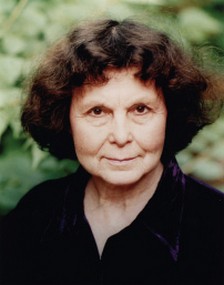
Sofia Gubaidulina (b. 1931, Russia), is regarded, together with Schnittke and Denisov, as one of Russia’s leading contemporary composers. The determined advocacy of Gidon Kremer, the dedicatee of Gubaidulina’s masterly violin concerto, Offertorium, helped bring the composer to international attention in the early 1980s. Gubaidulina is the author of symphonic and choral works, two cello concerti, a viola concerto, four string quartets, a string trio, works for percussion ensemble, and many works for nonstandard instruments and distinctive combinations of instruments. Her scores frequently explore unconventional techniques of sound production.
Gubaidulina is a member of the Akademie der Künste in Berlin and the Freie Akademie der Künste in Hamburg, the Royal Music Academy in Stockholm, and the German order “Pour le mérite.” She has also received numerous other recognitions. Major releases of her music have appeared on labels such as DG, Chandos, Philips, Sony Classical, BIS, and Berlin Classics.
Hell und Dunkel (Light and Darkness, 1976) is Gubaidulina’s only piece for solo organ. It begins in a well-tested avant-garde manner: gestures comprising fast scales and trills on brightly coloured manual stops are balanced with clusters and occasional low rumbles from the pedals. The first, ‘bright’ part of the piece culminates when the scalar passages transform into cluster glissandi covering the whole range of the keyboards. The focus then gradually turns to ‘darkness’: clusters in the bass register become more frequent and toward the end of the piece the opening scalar motive appears in its dark, pedal version. Gubaidulina has described the dynamics of these textures as ‘something Oriental in my subconscious. I feel at ease with Chinese and Japanese culture – a tendency toward contemplation and quiet sounds. Then comes activity, intellectual struggle, a longing for classicism. That is my Western side’.


